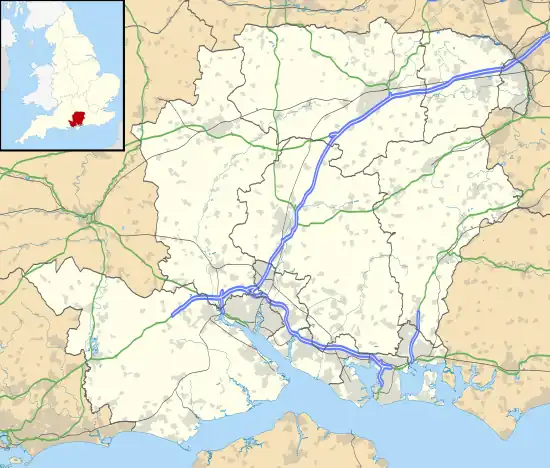| West Tisted | |
|---|---|
 St Mary Magdalene, West Tisted | |
 West Tisted Location within Hampshire | |
| Population | 165 (2011 Census)[1] |
| OS grid reference | SU652291 |
| Civil parish |
|
| District | |
| Shire county | |
| Region | |
| Country | England |
| Sovereign state | United Kingdom |
| Post town | Alresford |
| Postcode district | SO24 |
| Police | Hampshire and Isle of Wight |
| Fire | Hampshire and Isle of Wight |
| Ambulance | South Central |
| UK Parliament | |
West Tisted is a small village in the East Hampshire district of Hampshire, England. It is 6.7 miles (10.8 km) northwest of Petersfield, just off the A32 road.
Etymology
West Tisted is first recorded in around 932 CE as "ticces stede" which was the Anglo-Saxon name for West Tisted and comes from the Old English 'Ticce' and 'Stede' meaning Ticce's Farmstead. Alternatively the name might come from the word Old English word 'Ticcen' meaning young goat or kid, however the spelling of these early examples favours the first explanation. The Village shares the origin of its name with neighbouring East Tisted
History
The village was first properly settled in the early medieval period although a lot of evidence exists to suggest earlier activity if not settlement from the roman and prehistoric period.
In the 10th century West Tisted was part of the Anglo-Saxon Kingdom Wessex and its land was gifted from then King Eadmund I in around 941 CE. To manage this land gift a charter, a type of land document where the boundary of the land is described, was written for land then known as "Ticcestede". This charter is incredibly important for local history as it gives many early examples of place names. for example Stapley Lane and Clinkley Road.
West Tisted is also home to a 12th-century church, which involves taking a small path over a moat bridge to find it. This moat is likely what remains of a manorial site, possibly even a Norman Bailey.[2] Alongside the church is an ancient yew tree, estimated to be more than a thousand years old.
The manor house which was built of red brick and stone, had its origins in the medieval period but was heavily rebuilt in the Elizabethan Style. Unfortunately the manor house was demolished in around 1955–56 and was replaced with a modern mansion.
Local aristocrat Sir Benjamin Tichborne, Knighted 1618, (born circa 1582-88 and died 1665) third son of Sir Benjamin Tichborne, 1st Baronet, lived in the manor house. He is reported to have fought for the Royalist cause at the Battle of Cheriton (1644) and afterwards hid in a hollow oak tree behind the church, this tree was still known until recently as 'Sir Benjamin's Oak'. and after dying with no issue was buried with his wife Margaret in West Tisted Church.
Today
In modern times the village has been dominated by a large working farm, R.S. Hill & Sons, for which some of the residents work. R.S. Hill own the majority of farmland and woodland in the parish and the current West Tisted Manor. The company's surviving proprietor is Ashwin Hill, the remaining son.
References
- ↑ "Civil Parish population 2011". Neighbourhood Statistics. Office for National Statistics. Retrieved 23 January 2017.
- ↑ Historic record search hants.gov.uk
External links
- British History Online gives a detailed history of the parish of West Tisted
![]() Media related to West Tisted at Wikimedia Commons
Media related to West Tisted at Wikimedia Commons
